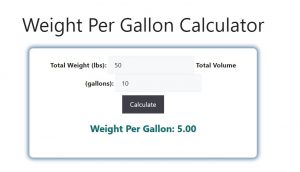About Weight Per Gallon Calculator (Formula)
The Weight Per Gallon Calculator is a valuable tool for various industries, including chemistry, manufacturing, and food production. Understanding the weight of a liquid per gallon is crucial for accurate measurements, formulation, and transportation. This calculator allows users to quickly determine the weight of any liquid based on its total weight and volume. In this article, we will explore the formula used for calculating weight per gallon, how to use the calculator effectively, and provide answers to common questions regarding this topic.
Formula
The formula for calculating Weight Per Gallon (WPG) is:
Weight Per Gallon (WPG) = Total Weight (W) / Total Volume (G)
In this formula:
- WPG represents the weight per gallon of the liquid.
- W is the total weight of the liquid in pounds or kilograms.
- G is the total volume of the liquid in gallons or liters.
How to Use
Using the Weight Per Gallon Calculator is a straightforward process. Follow these steps to obtain accurate results:
- Collect Data: Gather the necessary information, including the total weight of the liquid and its total volume.
- Input Values: Enter the values for total weight (W) and total volume (G) into the calculator. Make sure to use consistent units (e.g., pounds and gallons).
- Calculate Weight Per Gallon: Click the calculate button to determine the weight per gallon of the liquid based on your inputs.
- Review Results: Analyze the calculated weight per gallon to understand the properties of the liquid and make informed decisions.
Example
Let’s consider an example to illustrate how to use the Weight Per Gallon Calculator:
- Total Weight (W): 50 lbs
- Total Volume (G): 10 gallons
- Use the Formula: WPG = 50 lbs / 10 gallons
- Calculate: WPG = 5 lbs/gallon
In this example, the weight per gallon of the liquid is 5 lbs.

FAQs
- What is weight per gallon?
Weight per gallon refers to the weight of a liquid for each gallon of volume, providing insight into its density. - Why is it important to know the weight per gallon?
Knowing the weight per gallon is essential for accurate measurements in shipping, formulation, and safety assessments. - Can I use the calculator for different liquids?
Yes, the calculator can be used for any liquid as long as you provide the total weight and volume. - What units can I use for weight and volume?
You can use pounds or kilograms for weight and gallons or liters for volume, but ensure consistency in your calculations. - How does temperature affect the weight per gallon?
Temperature can affect the density of liquids, which in turn impacts their weight per gallon. - Can the calculator help with chemical formulations?
Yes, understanding the weight per gallon can aid in precise chemical formulations and mixing. - What if I have a liquid that doesn’t conform to standard weights per gallon?
You can still use the calculator by entering the specific weight and volume values for that liquid. - How is weight per gallon related to density?
Weight per gallon is a measure of density; higher weight per gallon indicates a denser liquid. - Is the weight per gallon the same for all liquids?
No, different liquids have different weights per gallon due to variations in density. - What should I do if I only have the weight of a container?
Ensure to subtract the weight of the container to obtain the net weight of the liquid for accurate calculations. - Can I convert between different units using the calculator?
The calculator typically does not perform unit conversions, so ensure that you input values in the same units. - Is the Weight Per Gallon Calculator suitable for solids?
No, this calculator is specifically designed for liquids; solids have different volume and weight relationships. - What is the significance of knowing the weight per gallon in transportation?
It helps determine shipping costs, packaging requirements, and safety measures for transporting liquids. - Can the calculator be used for industrial applications?
Yes, it is widely used in industries such as food processing, pharmaceuticals, and chemical manufacturing. - What happens if I input incorrect values?
Inputting incorrect values will result in inaccurate calculations, so double-check your inputs for accuracy. - How can I verify the accuracy of my weight per gallon calculation?
You can compare your results with known values for specific liquids to verify accuracy. - Is it necessary to use a specific temperature for calculations?
While it’s not required, using the same temperature for measurements can improve accuracy, especially for temperature-sensitive liquids. - Can the calculator assist in recipe development?
Yes, knowing the weight per gallon helps in scaling recipes and ensuring accurate ingredient measurements. - What is the average weight per gallon for water?
The average weight per gallon of water is approximately 8.34 lbs at room temperature. - How does weight per gallon influence material selection for containers?
Understanding the weight per gallon of a liquid helps in selecting appropriate containers that can withstand the weight and pressure.
Conclusion
The Weight Per Gallon Calculator is an essential tool for anyone involved in the handling, formulation, or transportation of liquids. By accurately calculating the weight per gallon, users can make informed decisions in various applications, from industrial processes to culinary arts. Mastering the use of this calculator enhances understanding of liquid properties, enabling better planning and execution in both personal and professional endeavors.
